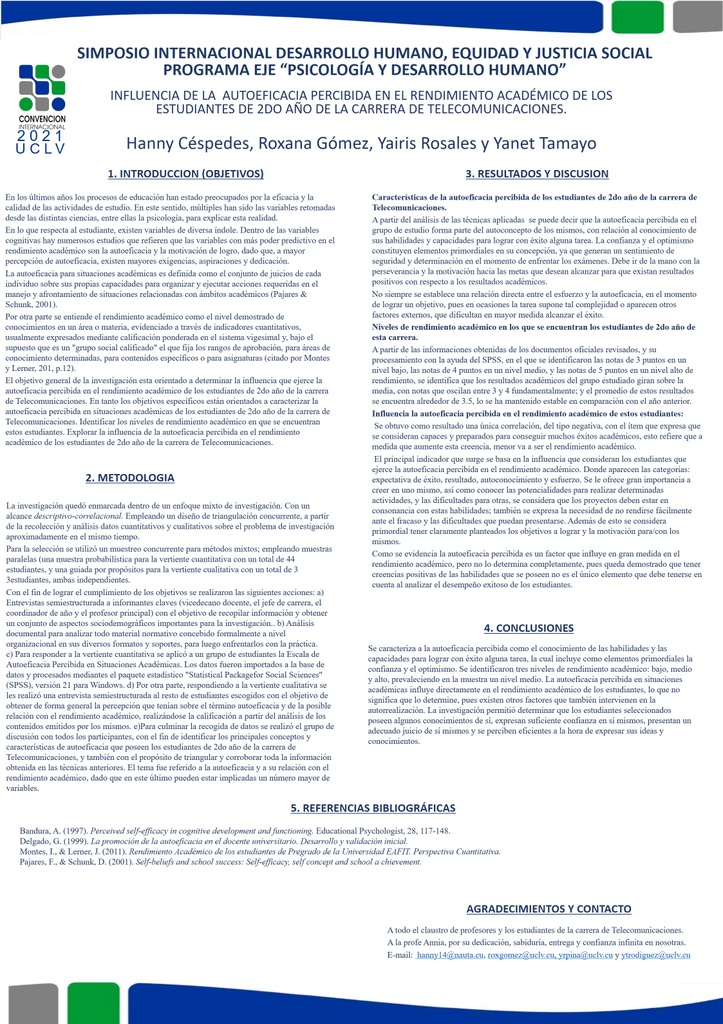Executive Secretary

Simposio Internacional “Desarrollo Humano, Equidad y Justicia Social"

La presente investigación se efectúo en la Facultad de Ingeniería Eléctrica ubicada en la Universidad Martha Abreu de Las Villas. Para su elaboración se planteó como objetivo fundamental determinar si existe influencia de la autoeficacia percibida en situaciones académicas en el rendimiento académico en los estudiantes de segundo año de la carrera de Telecomunicaciones. Para ello se asumió un enfoque mixto de investigación, bajo un Diseño de Triangulación Concurrente (DITRIAC). Se empleó un muestreo concurrente para método mixtos utilizando muestras paralelas, para la vertiente cuantitativa se seleccionó una muestra probabilística de 44 estudiantes elegidos al azar y para la vertiente cualitativa se optó por una muestra de 5 estudiantes guiada por propósito. Se emplearon como técnicas: el cuestionario Escala de Autoeficacia Percibida en Situaciones académicas; Revisión de Documentos Oficiales; Entrevistas Semiestructuradas a Informantes Claves; Entrevista Semiestructurada Grupal y un Grupo de Discusión. Entre los resultados más significativos se encontraron que los estudiantes establecen una correlación importante entre la confianza que posean en sus capacidades y la posibilidad de obtener éxito en los resultados académicos, pero esta se revela como negativa lo que significa que mientras más capaces y preparados se crean para obtener resultados óptimos menor será su rendimiento ya que su consideración puede ocasionar que disminuyan comportamientos y hábitos del estudiante. Además, reconocen la existencia de otros factores que influyen en la realización satisfactoria de la actividad entre ellos la motivación, el esfuerzo, los horarios docentes y la maestría pedagógica de algunos profesores.
The current investigation took place at the Faculty of Electric Engineering located at the University Martha Abreu in Las Villas. It´s main goal is to prove whether there is influence of the self-efficacy observed in academicals situations in the academicals performance in the second year students belonging to the carrier of Telecommunication. In order to achieve this goal, we made use of a mixed approach of investigation under a Concurrent Triangulation Design. We used a concurrent sampling for mixed methods employing parallels samples, for the quantitative aspect we chose a probabilistic sample of forty-four students chosen ran random and for the qualitative one we picked a sample of five students guided by purpose. The techniques applied were: The Self-Efficacy Scale questionnaire observed in Academicals Situations, Revision of Official Documents, Semi-Structured Interviews Performed to key Sources, Semi-Structured Group Interview, and a Debate Group. Among the most relevant accomplishments stood out that the students make a connection between the confidence they have in their abilities and the chances to achieve good academicals results, but this proves negative which means that the more capable they think they are in order to get good results the poorer will be their performance because their immoderate self-confidence may lead to negligence not only towards their study habits, but also in other key aspects that contribute to satisfactory academicals full fillments. They also acknowledge the existence of other influential agents that have to do with their capacity to perform successfully such as: motivation, effort, educational schedule and the teachers pedagogical skills.
Sobre el ponente

Hanny Céspedes
